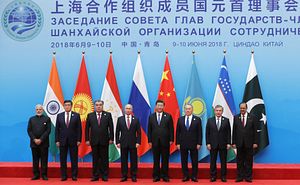As the heads of the Shanghai Cooperation Organization (SCO) counties descend on Bishkek for the group’s 19th Leaders’ Summit on June 14, it’s about that time to ask: So what?
In recent years the big drama of the SCO was its expansion to include both India and Pakistan.
The SCO as we know it now was originally rooted in a 1995 treaty, and dubbed the Shanghai Five in 1996, with China, Kazakhstan, Kyrgyzstan, Russia, and Tajikistan as members. Uzbekistan joined in 2001 and the group — initially focused closely on military and border matters between China and what had been the Soviet Union until 1991 — transformed into an SCO with ambitions of deeper cooperation.
In 2017, after years of dithering and delay, India and Pakistan were finally formally made members of the SCO. As Casey Michel wrote for The Diplomat at the time, “The inclusion of both India and Pakistan will not only expand the SCO’s geographic writ, pushing it that much closer to a pan-Asian forum, but, with India’s inclusion, the SCO suddenly finds itself with that much more geopolitical heft.”
The perpetual tumult of India-Pakistan relations was a concern for regional observers — can the SCO’s Shanghai Spirit — “mutual trust, mutual benefit, equality, consultation, respect for diverse civilizations and pursuit of common development” as the Chinese put it — thrive if some of its members are on the edge of conflict with regularity?
The answer is broadly yes: the SCO has weathered conflict between members in the past with a combination of fingers-in-the-ear ignoring of tensions and platitudes about respect for internal affairs and appeals for stability. But at the same time, that status quo also arguably hamstrings the group’s ability to operate beyond the boundaries of talk shops and counterterrorism exercises, not to mention undercuts its international credibility. Without question, the inclusion of India and Pakistan gave the SCO a broader region and a larger percentage of the world’s population. Yet it also introduced new points of friction that undercut the believability of the Shanghai Spirit.
The most obvious friction points are between India and Pakistan. With relations hitting a low earlier this year — due to the Pulwama attack, the subsequent Indian airstrike, the downing of an Indian jet and the surprising off-ramp taken in the form of Pakistan returning a captured Indian pilot — it’s not surprising newly reaffirmed Indian Prime Minister Narendra Modi and his Pakistani counterpart Imran Khan have no plans to hold a bilateral discussions on the SCO’s sideline. Modi’s team not only says he won’t be meeting directly with Khan, but Indian media also highlighted the fact that Modi would avoid Pakistani airspace entirely, flying via Oman and Iran to get to Kyrgyzstan.
Meanwhile, Modi does have plans to hold bilateral meetings with Russian President Vladimir Putin and Chinese President Xi Jinping, as well as with the host, Kyrgyzstan’s President Sooronbay Jeenbekov.
As host, Jeenbekov gets bilateral meetings with everyone he so desires. But there are few expectations for big news. Jeenbekov already welcomed China’s Xi, and after their talks uttered the words Beijing wants to hear: “Taiwan is inseparable part of China and the Kyrgyz side supports China in that matter” and the internment of ethnic Kyrgyz and other Muslim groups in Xinjiang is China’s own “internal matter.”
If Xinjiang comes up, it’s likely to be in the context of security and stability — no mention of agitation in Kyrgyzstan and Kazakhstan with regard to ethnic Kazakhs and Kyrgyz imprisoned in Xinjiang’s camps. China’s economic clout with the SCO countries is significant. We can expect praise for the Belt and Road Initiative (BRI) — though indirectly in the group’s official documents, given India’s distaste for the strategy — and a united front but little new with regard to Afghanistan.
Another person to watch will be Kazakh President Kassym-Jomart Tokayev, who arrived in Bishkek the day after his inauguration which was marred by arrests of both protesters and passersby in Almaty and Astana. Protests and heavy police presence in Kazakhstan’s major cities have cast a cloud over Tokayev’s election. On June 13, a representative of the General Prosecutor’s Office said 957 people had “incurred sanctions” for involvement in the protests. As Eurasianet reports, Kazakhstan’s Interior Minister has bizarrely claimed that nobody was arrested during demonstrations on June 12, despite countless images tweeted by journalists of people being pulled, pushed, and carried into police vans.
Don’t expect the SCO to say much about that. First, it’s an internal matter, and, second, it’s observers gave the Kazakh election a clean bill of health (while the OSCE decried significant failings).
Immediately after the SCO summit, many of its attendees — most notably Xi and Putin, but not Modi — will hop on planes for Dushanbe to attend the fifth Conference on Interaction and Confidence Building Measures in Asia (CICA).

































